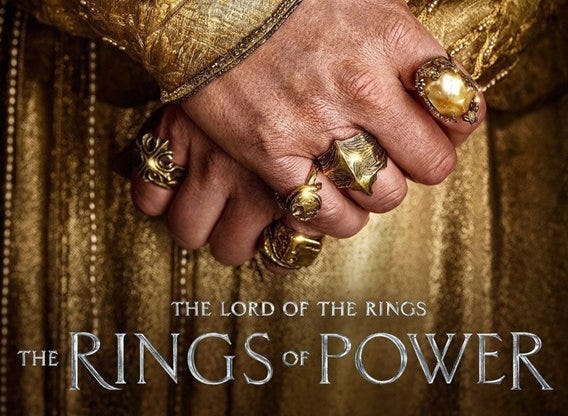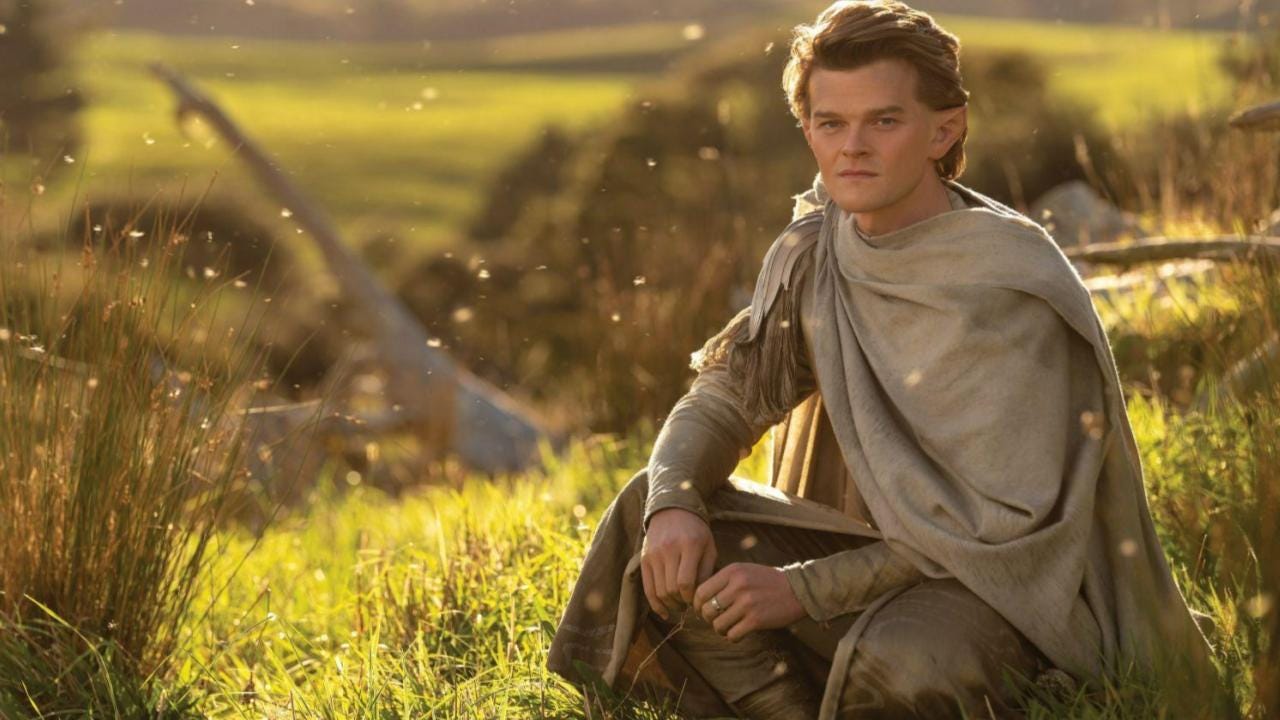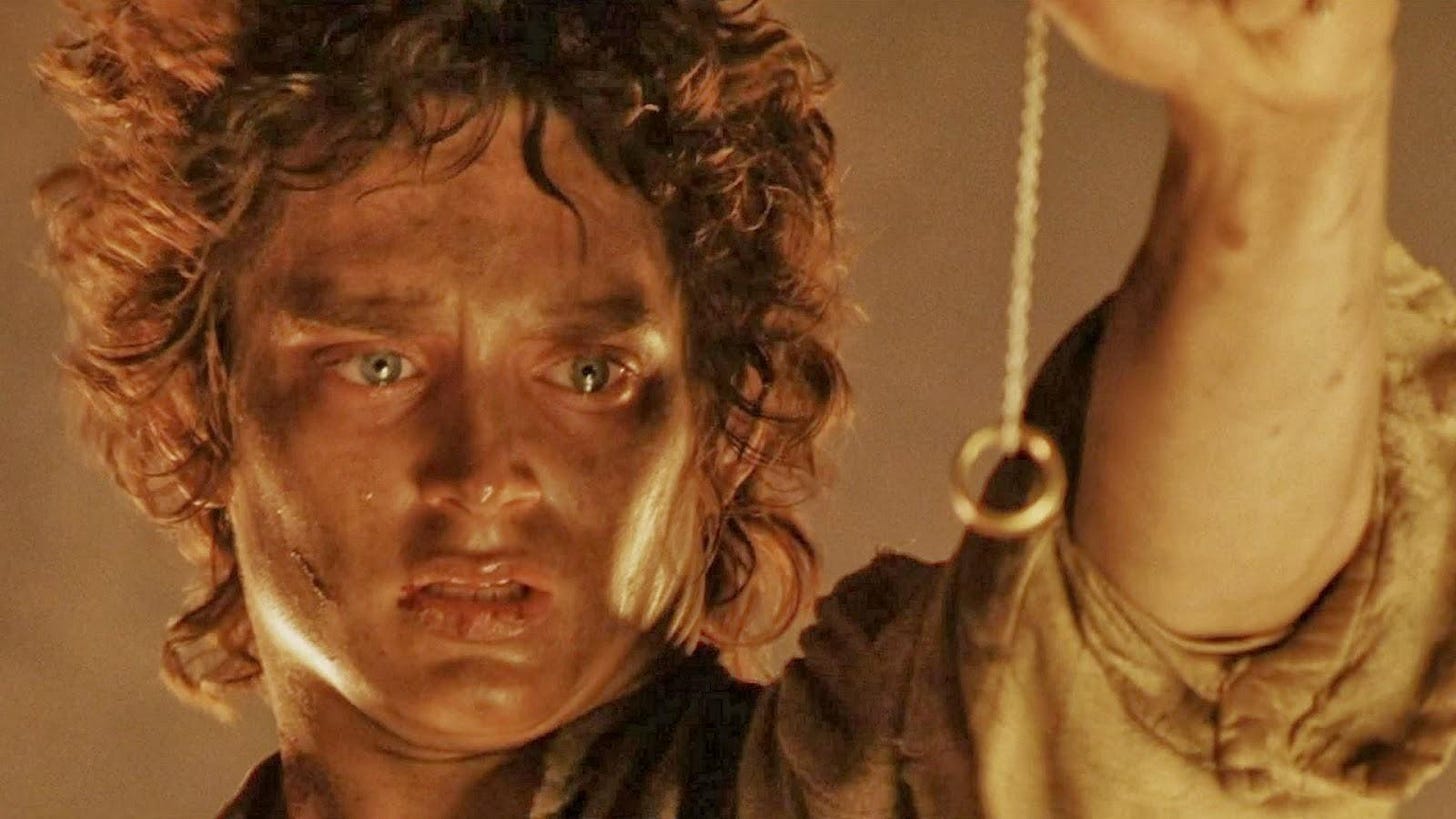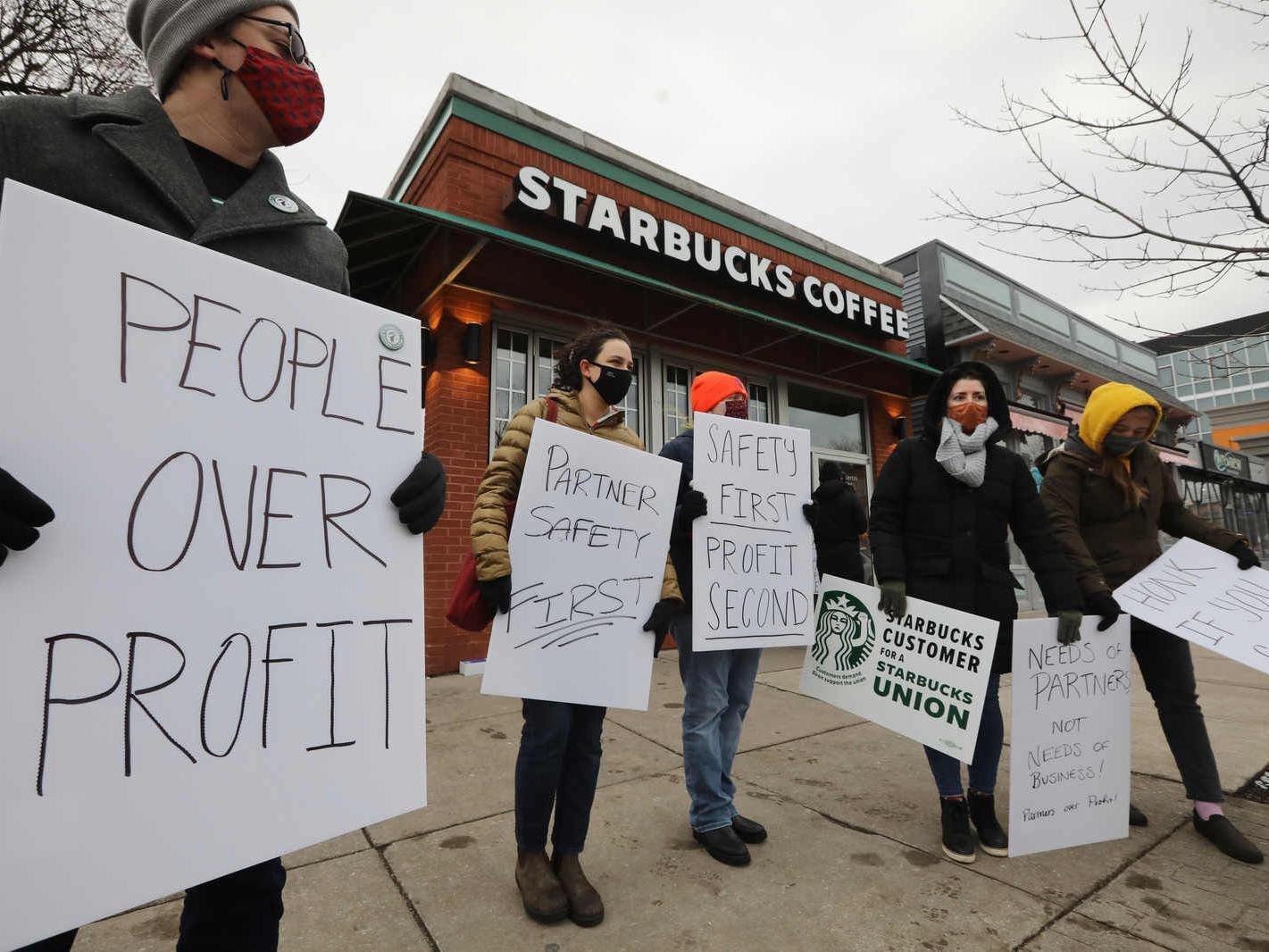Nazi Elves and Cockney Orcs: The Rings of Power, Class and Royalty
How Amazon's new series gives us a new lens on the culture wars
The Queen has been laid to rest, but her power lives on. Her passing has sparked a heated conversation online about who should hold the rings of power in society, one that has spilled past the UK’s shores and spread around the world. And it is no surprise, because whether we’re talking about the future of British royalty, or billionaires scheming to escape a heating planet, we’re continuously wrestling with growing wealth inequality in the 2020’s.
In an age in which so many cultural conversations fixate on identity politics, it can be easy to forget just how fundamental class is to our increasing polarisation. Most tribes in the culture wars are reacting to this in some way, from QAnoners to the New Right to social justice activists. But with so many different tribes shouting at once, the conversation is noisy and hard to follow. So noisy, in fact, that we sometimes need to turn toward art for clarity.
Or, toward Middle-Earth. This is a piece about nazi elves, cockney orcs, twee harfoots and surly mountain dwarves. It’s about Amazon’s new series ‘The Rings of Power’, and what it can reveal about the class tensions beneath the culture wars.
Nazi Elves
‘The Rings of Power’ has sparked a predictable conversation around race and diversity in fiction, with some up in arms that the series cast black dwarves and elves. I’ll lay my cards out early and say that I disagree with those critiques, in particular when they’re made in response to fantasy series. I think representation is important in art; it normalises and expands our frames around what is possible socially. Of all the genres, fantasy and sci-fi stories are the most natural places for that to happen.
This is a piece not about diversity, but about what the conversation around diversity sometimes clouds. It’s about the what might lie behind the Misty Mountains of identity politics. The time has come to voyage to Middle-earth to see what’s going on down there.
Early in the series, elf politician Elrond is sitting writing a speech for his king in an idyllic glade. He’s interrupted by a courtier, who in an upper-class English accent informs him his presence won’t be required at an upcoming meeting, as it’s only for full-blooded elves. Elrond, who is half human, shrugs this off as if he’s just been told by a waiter that the tuna nicoise he just ordered is off the menu. It’s the viewer’s first hint that racial purity matters to elves. But as the story unfurls, we see there’s more to their conceptions of purity than just having pointy ears: it’s also rooted in how you think. The worthiness of your bloodline. What side your ancestors chose in wars that happened long ago.
We’re soon introduced to different societies that populate Middle-Earth. We meet the harfoots, this world’s proto-hobbits. They’re simple folk, and while they’re poor, they love to sing and dance and at least they have one another. They all have Irish accents. Later, we meet the dwarves, who are quick to anger but great engineers and all sound Scottish. Later still, we’re introduced to the antagonists: the orcs. The orcs are foul, violent and all have working-class East London (Cockney) accents. The elves act as guardians and morally advanced protectors over the humans, many of whom they look down on for picking the wrong side in the last great war against Sauron’s old boss, Morgoth (you have to roll the ‘r’ with as much cringe as possible to say it right).
The humans resent the elves for their arrogance and their riches. To many elves, the humans are a basket of deplorables. The Harfoots don’t have much political power, but they are salt of the earth, spritely and creative. The dwarves are somewhat removed from the politicking, but have designs of their own. There is a very clear hierarchy of worth and status, with the elves at the top and the Harfoots at the bottom.
You can probably see where I’m going with this. What has been missed in the furore around one kind of representation is what The Rings of Power tells us about class in the modern age. The fact that comparatively little has been written about, say, the caricaturing of the Irish or signalling ‘bad guys’ by giving fantasy characters working class accents is interesting in itself.
We aren’t conditioned to see class in the 2020’s in the same way we’re conditioned to see race and gender identity. Imagine for a moment the elves lounging around their glowing golden glades, and one of them opens his mouth and a thick Cockney accent comes out. ‘Right guv, hand us over that manna, I’m bleedin’ starvin’. Imagine the orcs speaking with clipped, BBC English accents: “I say, fellow, hand over that ring or there’ll be trouble’. What changes?
Class and Identity
A concern around who has more and who has less is so built into us that it defines every human interaction. As researcher Frans de Waal has shown, fairness and empathy are qualities that mammals have in general, not just humans. You may have seen it before, but if not it’s worth checking out some of the experiments that led to those conclusions, especially what happens when you reward capuchin monkeys differently for performing the same task.
Social class isn’t limited to our economic resources; it’s also about opportunities we have access to, and how worthwhile we think we are to begin with. It’s a complex mental, social and economic phenomenon. Our wrestles with class defined much of the ideological warfare of the 20th century. And it hasn’t gone anywhere.
It’s a major part of the meaning crisis, because the idea that our status is linked to how much we own, or can acquire, has much deeper roots in the ways we perceive reality in the West. Our existing economic systems and our view of the world go hand in hand. Enlightenment thinkers like Descartes and Hobbes presented a radical new view of human beings, matter and consciousness. Hobbes began to conceive of our brains as machines, adding to an obsession with controlling matter (things) that we live with to this day. As Vervaeke points out in Episode 22 of Awakening from the Meaning Crisis:
“What Hobbes is doing is killing the human soul! And of course that's going to exacerbate the cultural narcissism, because if we no longer have souls, then finding our uniqueness and our true self, the self that we're going to be true to, becomes extremely paradoxical and problematic. If you don't have a soul, what is it to be true to your true self? And what is it that makes you utterly unique and special from the rest of the purposeless, meaningless cosmos?”
One response, perhaps the only one if we accept scientific materialism as our defining worldview, is to define ourselves in relation to things. For the scientific mind, things are real, and the quality of those things is less real, or not real at all. Your brain is real, but your consciousness isn’t. Quantity is real, but quality is not. We have wrapped our definitions of worth and power around this twisted materialist worldview.
In doing so, consumer culture strips away the vitality from the world. It tries, unsuccessfully, to remove the mystery from life, to devalue the things that can’t be held in our hands or touched or sold. It denies the existence of something outside of its frame on reality, because scientific materialism tells us that eventually that won’t exist either. Science will explain everything. This is no less than an attempt to remove the sacred - that thing bigger than us as individuals or as a culture - from the world.
But only an attempt. As Durkheim and other sociologists have argued, we can never really remove the sacred from life. We can only change what we hold sacred. As historian Eugene McCarrher explores in ‘The Enchantments of Mammon’, in much of the world capitalism has come to replace religion.
As summarised by Daniel Steinmetz-Jenkins in The Nation, McCarrher argues that ‘the mysteries and sacraments of religion were transferred to the way we perceive market forces and economic development… a “migration of the holy” to the realm of production and consumption, profit and price, trade and economic tribulation. Capitalism, in other words, is the new religion, a system full of enchanted superstitions and unfounded beliefs and beholden to its own clerisy of economists and managers, its own iconography of advertising and public relations, and its own political theology.”
In most Western nations, that thing that’s ‘bigger than us’ has become capitalism itself, and specifically economic growth and consumerism. The invisible hand of the market, which moves in mysterious ways and must be heeded. It was an adherence to this religion that would lead to a million Irish people dying during the famine while the British government refused to intervene, because intervention itself would be recognising that the invisible hand of the market isn’t really a god. There were other factors at play, including the kind of superiority the elves would likely feel toward the harfoots.
We have to be careful what we make sacred. Once status and material wealth become more important than human life, we have gone the way of the dark gods of Middle-Earth.
Dark Gods
The original villain in the universe of The Rings of Power is Sauron’s old boss Morgoth. The name isn’t far from another metaphor for evil, Moloch. In his essay ‘Meditations on Moloch’, Scott Alexander uses this old Canaanite God to whom people sacrificed their children as a metaphor for the incentive structures that govern our economies.
Moloch promises you material power in exchange for that which matters most to you. His incentive structures lead to winner-take-all outcomes and destroy the commons in the process. In the piece, Alexander argues that only another god can kill Moloch. So what is the ‘other god’ that can kill Sauron and liberate Middle-Earth? As we see much later in Tolkien’s saga, it’s love, friendship, valour, virtue, and courage. The innate goodness that drives Frodo and Sam from the Shire all the way to Mount Doom.
And this may be a deep universal truth. But as I’ve watched The Rings of Power, seeing the Harfoots tiddle-tee-deeing around their gypsy caravans while the elves look down regally from their glowing glades, I can’t help but question whether heart is enough. In our own world, can virtue alone can disrupt a system that’s leading to increasing wealth inequality? I don’t think it can, at least not the virtue of the individual alone. Moloch is a complex, adaptive system that responds to threats, and virtue is a threat. Our economic incentive structures are exactly that: structures. And so change at the individual level will never be enough. The transformation also has to happen at the deepest structural level.
A World Divided
The socioeconomic rifts that underlie our growing cultural polarisation aren’t just based on a difference in ideas, but circumstance. On actual economic realities that prevent people from opportunity, and sap their souls.
In ‘The Road to Somewhere’, British journalist David Goodheart highlighted a growing divide between what he calls ‘somewheres’ and ‘anywheres’. Anywheres are cosmopolitan city dwellers who participate in a globalised knowledge economy, usually doing jobs that involve thinking. They tend to be progressive and don’t feel deeply rooted to a particular place. They are as comfortable in a New York co-working space as they are in a hotel in Paris. Somewheres are more locally rooted, in their state or region for example, and tend to skew more conservative. Many commentators have attributed the Brexit vote in the UK and the election of Donald Trump to this increasing split between a metropolitan elite, who sneer at the somewheres as Hilary Clinton, channeling elven superiority, did with her infamous ‘basket of deplorables’ line in reference to Trump’s supporters.
More recently, the writer N.S Lyons has suggested a similar split between what he calls ‘Virtuals’ and ‘Physicals’. Virtuals typically work white-collar jobs that can increasingly be done online. Physicals do blue-collar jobs that involve their bodies. Jobs that enable the Virtuals to live their lives. Physicals drive trucks, work farms, and keep society running.
Lyons argues that our culture wars are intensifying because the two groups are increasingly disconnected from one another, something particularly present in the media response to the Dutch farmer protests this summer, and the Canadian Trucker protests earlier this year, which cast them as either racist or backward. It was another version of class disdain, of the Virtuals unable to see the Physicals as people with real issues trying to get them heard. Lyons is partly drawing on the work of historian Christopher Lasch, who predicted these trends in his 1997 book ‘The Revolt of the Elites’, writing:
“The thinking classes are fatally removed from the physical side of life… Their only relation to productive labor is that of consumers. They have no experience of making anything substantial or enduring. They live in a world of abstractions and images, a simulated world that consists of computerized models of reality – “hyperreality,” as it’s been called – as distinguished from the palatable, immediate, physical reality inhabited by ordinary men and women. Their belief in “social construction of reality” – the central dogma of postmodernist thought – reflects the experience of living in an artificial environment from which everything that resists human control (unavoidably, everything familiar and reassuring as well) has been rigorously excluded.”
The interweaving of identity, ideological, status and power is too complex to boil down into a single cause. However, it is certainly possible for the cultural conversation to underplay particular causes, consciously or unconsciously, and I believe that is what’s happening around class. The divide between the thinking classes and the working classes is absolutely fundamental to the levels of cultural polarisation we’re living through.
Complexity scientist Peter Turchin has argued that the cultural unrest of the 2020’s is due to what he calls ‘Elite Overproduction’, the idea that there are too many educated people and not enough jobs. The resulting battle for status and access creates the need for selection, some way to separate the correct-thinking elite, from the wrong-thinking elite. What emerges is a complex language game of ever changing concepts about what’s socially acceptable and what isn’t. A game that those with elite educations learn to play well while anyone outside the in-group must adapt to or be shut out whatever their background or identity.
The Escape to Valinor
This is echoed in Mary Harrington’s idea of Luxury Gnosticism, the idea that an educated ‘laptop elite’ are retreating into virtual worlds. Worlds where, as N.S Lyons argues, theory can become more important than reality. Where economic inequality doesn’t matter as much as nuances of narrative positions and signalling. A mental world where identity games have as much reality as rocks and trees, and the complexities and realness of the physical world can be ignored.
In Middle-Earth, this mythic fantasy is reality. As we soon discover in The Rings of Power, the ultimate reward for an elf is to return to their homeland of Valinor. A place where they can be exclusively among their own, immortal and forever free to pursue the higher things in life, artistic pursuits and matters of philosophy. To be bathed in a soft golden light among one’s own.
The series’ dour hero, Galadriel, is about to enter Valinor (don’t forget to roll the r) in reward for her military service. At the last moment, she jumps off the boat to swim back to the muck of Middle-Earth to keep hunting Sauron. She soon encounters Halbrand, a hunky and rough-around-the-edges but charming human man on a raft. He seems like a working class lad, but later it turns out he’s the rightful heir to the Southlands, where the orcs are currently killing innocents while growling Cockney rhyming slang.
As a commoner who has royal blood pumping through his veins, Halbrand represents the middle classes, who exist at the nexus of the nightmare of falling down the ladder, and the dream of climbing up. If Halbrand can become king of the Southlands, he will ascend to the level of royalty. If not, he’ll probably die in a bar fight.
Coffee Rings of Power
By presenting us with a king in commoner’s clothes, The Rings of Power commits itself to its own world. A world in which real change comes from the elite recognising their birthright, as Aragorn does in Lord of the Rings, rather than change coming through a process by which that birthright is questioned. This questioning is currently happening regarding the role of royalty in the UK, but most people don’t live in the UK. A reality we all share is the rise of a billionaire class who are, for all intents and purposes, a new global royalty. Supposedly self-made royalty who got where they by aligning themselves to the invisible hand of the market.
They include the CEO’s of huge corporations, which like the various aristocratic houses in days of old vie for power and influence over every aspect of life. But they can only go so far without sparking an all out rebellion, and so as always these corporations have to present themselves as in service to the people, even though most of the people know this to be a lie.
We can see just how shallow this can be by looking at what happens when these corporations are challenged to redistribute power to their workers. Starbucks prides itself on being an inclusive workplace, and has attracted many LGBTQ+ employees. Right now, many of those employees in the US are unionising. Unsurprisingly, they’re facing intense resistance from their corporate overlords. As reported by The New Yorker, “Starbucks has fired some two dozen organizers and stalled union votes by contesting the legality of individual elections. It has promised more pay and benefits to employees at non-union stores and shut down several unionized locations.” Speaking to the Times, CEO Howard Schultz said that he would never accept a union at Starbucks.
The greatest threat to Moloch, our embedded system of perverse incentive structures, would be a serious challenge to the corruption of the financial and political systems that lead to economic inequalities, and all the mental health, racial and social inequalities these perpetuate. A concerted effort to address growing wealth inequality, lack of class mobility, environmental degradation and manipulation of information. Not from the surface, but from the very roots of the problem. The level of who has economic power and agency. And beneath this, the deeper level of how we perceive, how we think, what we believe we deserve. The very idea we have of the world, and who and what we are. Corporations drool over opportunities to champion diversity and inclusion, but rarely follow through if that involves a meaningful redistribution of power and wealth.
Marxist scholar Adolph Reed has made enemies on all sides of the political spectrum by arguing that identity politics is simply another tool of capitalism. Institutions and corporations focus so heavily on identity issues because it allows them to redirect the conversation from the underlying causes of inequality, which are primarily about socioeconomic class. Solving class issues requires genuine, difficult systemic change. Endless argument about identity does not, and is therefore selected for by elite institutions in order to maintain the status quo.
The idea that power relationships are the key driver of society is a traditionally postmodern one. And while postmodern critiques of power have traditionally been the found on the left, they’re now emerging on the right through the Neo-Reactionaries or New Right. When I spoke to podcaster Alex Kaschuta for my book to get a sense of how this movement is affecting the wider cultural landscape, she described a disparate movement that is united by loose system of beliefs that the media, political and cultural institutions are sharing a single authoritarian message around progressive identity politics, and that its an order that needs to be overthrown. When I mentioned that their concerns about embedded power sounded quite postmodern, Kaschuta agreed and explained that the phenomenon has also been called the ‘postmodern right.’
That stuck with me, because as soon as different sides of the political spectrum are all talking about embedded power inequalities as a primary force in society, a new synthesis in the conversation about class and economic inequality might not be far behind.
Across the cultural and political divides, there is a growing sense that our existing economic system is leading to more and more people being fucked over by a small group of the super-rich. As inflation bites throughout the world and developed nations go through a cost of living crisis, my sense is that we’re only seeing the beginnings of a new conversation, and a new kind of anger. Perhaps it is an unfolding that will lead us to an understanding of what many in Middle-Earth already know: nobody should wield the one ring.
Sailing into the West
The Rings of Power is only a few episodes in as I write this. In the real world, the king of Britain is only a few days into his reign. Both of these very different phenomena invite us to re-evaluate class in the 2020’s. As I mentioned earlier, it isn’t a question of trying to boil down the complexity of power relationships to one lens at the expense of identity, race, geography and the millions of other factors leading to inequality, polarisation and social tensions. It’s a ‘yes and’. A process of widening our frames on the culture wars to encompass class as much as possible and inquire into the role of corporations, royalty, academia and other institutions have in keeping the conversation around it stuck.
The more I’ve researched this over the last few months, the more it’s become a kind of mantra as I observe Twitter feuds or culture war eruptions, something that adds to my frame. Where is the class dynamic in this? What’s at stake, and who is vying for more status, opportunity or access? While we can see it clearly in The Rings of Power or Game of Thrones, there is so much noise in our own world that it’s easy to lose that signal.
And however our global conversations around class and inequality evolve, my hope is that they move toward not just toward fairness, but toward virtue and the sacred. That’s why, while there are few characters who’ve really hooked me in The Rings of Power, I’m rooting for Elrond. I’m rooting for him because I know at some point is going to stand at the top of Mount Doom and scream ‘throw the ring into the fire, Isildur!’ He understands that the One Ring should never have existed, and belongs in the fires in the heart of the earth.












Beautiful. I love how you point out that people distracted by the race and gender diversity forgot the obvious class warfare in the show. I do wonder if they plan to go somewhere with it or if they just want to play it coy not to offend their Lord and savior Bezos. Time will tell. Great work!
This is likely my favorite article by you, Alex… while I’ve often thought identity politics was a distraction to the class and wealth disparity issues, I did not see the accents and roles in Rings of Power as clearly as you did, it cracked me up and made me cranky. Hahaha…. I do truly hope the left and new right can see how close we are to being on the same side if we could just recognize the distractions that Moloch uses to keep us fighting amongst ourselves.